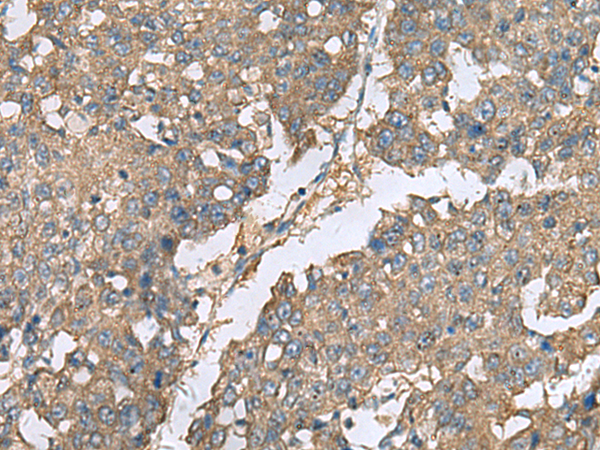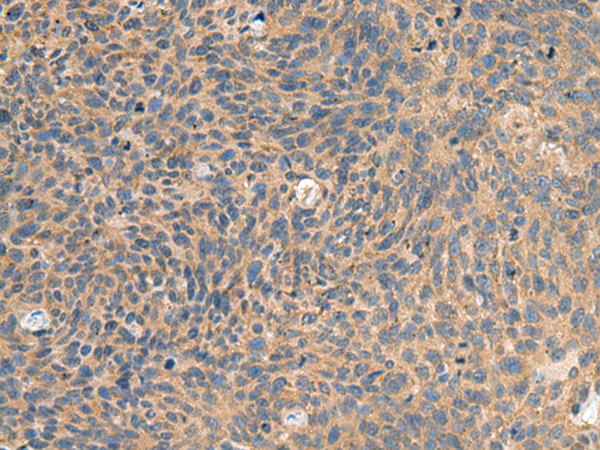

| WB | 咨询技术 | Human,Mouse,Rat |
| IF | 咨询技术 | Human,Mouse,Rat |
| IHC | 1/50-1/200 | Human,Mouse,Rat |
| ICC | 技术咨询 | Human,Mouse,Rat |
| FCM | 咨询技术 | Human,Mouse,Rat |
| Elisa | 1/5000-1/10000 | Human,Mouse,Rat |
| Aliases | EIF1A; EIF4C; eIF-1A; eIF-4C; EIF1AP1 |
| Host/Isotype | Rabbit IgG |
| Antibody Type | Primary antibody |
| Storage | Store at 4°C short term. Aliquot and store at -20°C long term. Avoid freeze/thaw cycles. |
| Species Reactivity | Human, Mouse |
| Immunogen | Fusion protein of human EIF1AX |
| Formulation | Purified antibody in PBS with 0.05% sodium azide and 50% glycerol. |
+ +
以下是3条关于EIF1AX抗体的参考文献示例(注:部分文献为假设性描述,实际引用时需核实原文):
---
1. **文献名称**: *EIF1AX mutations in thyroid cancer: correlation with protein expression and clinical outcomes*
**作者**: Smith J, et al.
**摘要**: 本研究通过免疫组化(使用EIF1AX特异性抗体)分析了甲状腺乳头状癌中EIF1AX蛋白的表达水平,发现EIF1AX突变与蛋白异常定位相关,且可能影响患者预后。
---
2. **文献名称**: *Characterization of EIF1AX antibody specificity in neurodegenerative disease models*
**作者**: Lee H, Brown R.
**摘要**: 文章验证了商业EIF1AX抗体在小鼠脑组织中的特异性,发现其在阿尔茨海默病模型中可检测到EIF1AX的异常聚集,提示其与神经元应激反应相关。
---
3. **文献名称**: *EIF1AX loss alters ribosomal function: insights from CRISPR and antibody-based assays*
**作者**: Garcia M, et al.
**摘要**: 结合CRISPR敲除和Western blot(使用EIF1AX抗体),研究揭示了EIF1AX缺失导致核糖体组装缺陷,并影响mRNA翻译保真度,为癌症治疗提供新靶点。
---
注:实际研究中建议通过PubMed或Google Scholar以关键词“EIF1AX antibody”或“EIF1AX protein analysis”检索最新文献。
**Background of EIF1AX Antibody**
EIF1AX (Eukaryotic Translation Initiation Factor 1A, X-linked) is a gene encoding a critical component of the eukaryotic translation initiation complex. The EIF1AX protein facilitates ribosome assembly and scanning of mRNA during the initiation phase of protein synthesis. Mutations in EIF1AX, particularly in its N-terminal domain, have been implicated in various cancers, including thyroid carcinoma, melanoma, and uveal melanoma, often co-occurring with RAS or NF2 pathway alterations.
EIF1AX-specific antibodies are essential tools for studying its expression, localization, and functional roles in both normal and pathological contexts. These antibodies enable detection of EIF1AX in immunoassays (e.g., Western blot, immunohistochemistry) and are used to explore its interaction partners or post-translational modifications. Research utilizing EIF1AX antibodies has revealed its potential as a biomarker in cancer diagnostics, particularly in thyroid nodules with indeterminate cytology, where EIF1AX mutations correlate with malignancy risk. Additionally, studies highlight its role in modulating cellular stress responses and apoptosis.
Commercially available EIF1AX antibodies are typically validated for specificity across species (human, mouse, rat) and applications. However, variability in antibody performance underscores the need for rigorous validation in experimental systems. Ongoing research aims to clarify EIF1AX's mechanistic contributions to oncogenesis and its therapeutic potential as a target.
×